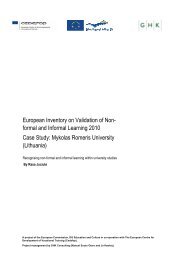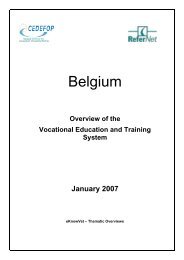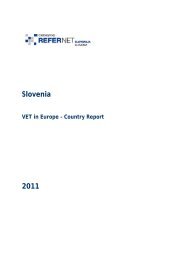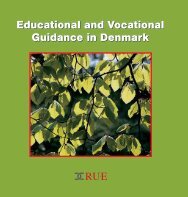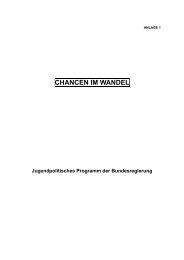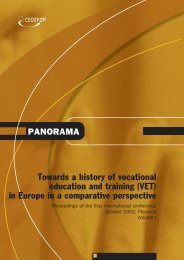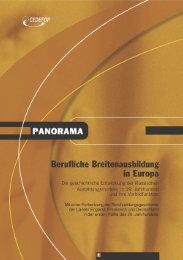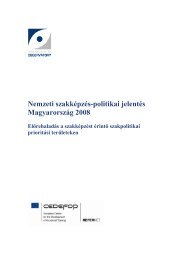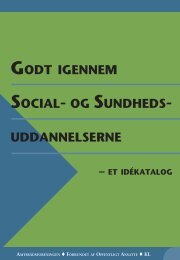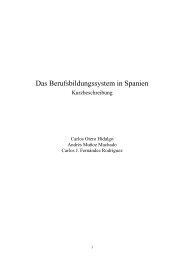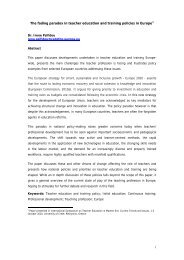PROFF – Professionalisation of VET teachers for the future - Europa
PROFF – Professionalisation of VET teachers for the future - Europa
PROFF – Professionalisation of VET teachers for the future - Europa
You also want an ePaper? Increase the reach of your titles
YUMPU automatically turns print PDFs into web optimized ePapers that Google loves.
different institutions <strong>–</strong> a major step <strong>for</strong>ward over more traditional models <strong>of</strong> cooperationwhich mainly involve principals and heads <strong>of</strong> department.3.6. AccreditationCompetence and accreditation are complementary. Competences describe an individual’sability to per<strong>for</strong>m well-defined pr<strong>of</strong>essional tasks. Accreditation is <strong>the</strong> process <strong>of</strong>attributing/providing <strong>for</strong>mal evidence <strong>of</strong> value to competences, irrespective <strong>of</strong> <strong>the</strong> way <strong>the</strong>secompetences have been gained. Certification <strong>of</strong> competences is <strong>the</strong> process <strong>of</strong> issuingcertificates or diplomas, which <strong>for</strong>mally recognise <strong>the</strong> achievements <strong>of</strong> an individual (Brugia,2002). The Eurydice network defines a certificate <strong>of</strong> qualification/diploma/degree as <strong>the</strong><strong>of</strong>ficial pro<strong>of</strong> <strong>of</strong> a qualification acquired by a pupil or student after passing an examination orby completing a course <strong>of</strong> training (de Blignières-Légeraud, 2002). The prime purpose <strong>of</strong>accreditation is to meet <strong>for</strong>mal requirements on teacher qualifications imposed by clients,government regulations and work organisation (Jarkko, 1996).In most European countries, accrediting <strong>teachers</strong> is regulated by ministerial authority. Mostly<strong>the</strong>y require both a university degree (or in some instances, a nationally recognised vocationalqualification) and a specific qualification as a teacher. In addition <strong>VET</strong> <strong>teachers</strong> nearly alwaysrequire practical work experience.Teachers contrast with workplace trainers and instructors. While national regulations impose(varying) requirements on staff involved in initial vocational training, <strong>the</strong>re is no <strong>for</strong>maldefinition <strong>of</strong> <strong>the</strong> qualifications or <strong>for</strong>mal training required to take part in continuing training.Accreditation <strong>of</strong> teacher competences is key <strong>for</strong> all <strong>PROFF</strong> case studies <strong>–</strong> particularly when<strong>the</strong> target population includes <strong>teachers</strong> and trainers already working but who do not have <strong>the</strong>qualifications required (or soon to be required) by law. Often accreditation may be required<strong>for</strong> <strong>teachers</strong> to continue <strong>the</strong>ir careers. Accreditation may also make it easier <strong>for</strong> programmemanagers to gain state or European funding.Five programmes studied provide <strong>for</strong>mal accreditation to <strong>the</strong>ir students.The ‘dual trajecten bve’ programme (<strong>the</strong> Ne<strong>the</strong>rlands) allows participants gradually toimprove <strong>the</strong>ir skills until <strong>the</strong>y earn a <strong>for</strong>mal teaching qualification. The course has received<strong>of</strong>ficial national recognition. Credits are certified by Fontys teacher training institutes.Participants can develop <strong>the</strong>ir competences and qualifications gradually up to teacher level.Participating in <strong>the</strong> course thus provides a significant boost to trainees’ careers.O<strong>the</strong>r programmes which <strong>of</strong>fer <strong>for</strong>mal accreditation to students include ‘vocational pedagogyin enterprises’ (Norway), ‘continuing education <strong>of</strong> <strong>teachers</strong> within <strong>the</strong> scope <strong>of</strong> schoollibraries’ (Portugal), and EUD-IT (Denmark). Most o<strong>the</strong>r projects (e.g. <strong>the</strong> Italian HEPprogramme) give credit which participants can use to pursue <strong>the</strong>ir studies in fur<strong>the</strong>r or highereducation. In this way <strong>the</strong> teaching provided becomes a component in a long-term programme29



